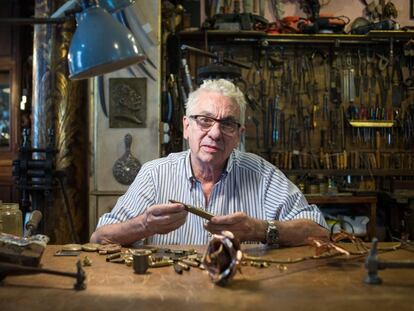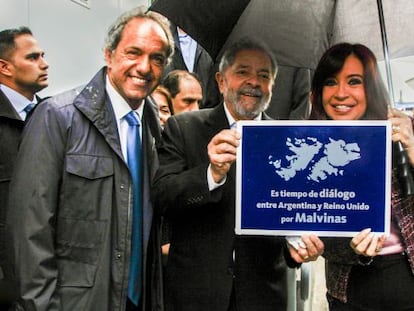Thirty-five years later, a drive to identify soldiers who died in Falklands War
Red Cross will soon start exhuming bodies that lie under graves marked as “known by God alone”
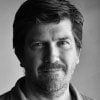
Eduardo Gómez was 19 when he died at the Battle of Mount Harriet during the Falklands War. It was 2am on June 12, 1982 and Argentina was just two days away from surrendering to Britain. Eduardo’s mother and eight siblings never knew which day he was sent to the front, or even that he had died at all.
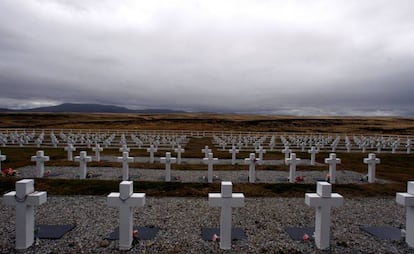
When it was all over and the soldiers returned to the mainland, Eduardo was simply not there. The family placed dozens of telephone calls to the army, and left their adobe home in Chaco, one of the poorest provinces in Argentina, to go look for him in the hospitals of Buenos Aires.
It was two months before a military official met with them back in their village and told them that Eduardo “had died in combat.”
In 1991 his sister Norma traveled to the Falkland Islands (known as Las Malvinas in the Spanish-speaking world) and visited the Argentine Military Cemetery, also known as the Darwin cemetery. There, she found out that Eduardo was one of 123 people buried in graves marked only with the inscription: “Argentinean soldier known by God alone.”
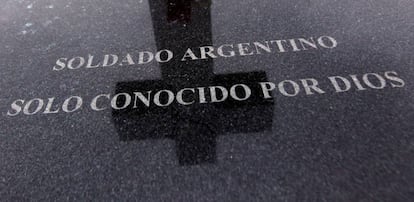
Twenty years after that trip, Norma became the driving force behind an identification process for the bodies buried in the Falklands, which will be carried out by the International Committee of the Red Cross (ICRC) beginning on June 19.
Among the 230 graves inside the cemetery, there are 123 that contain the remains of men who got caught up in the disorderly retreat that followed Argentina’s military defeat, and whose bodies often ended up in unmarked mass graves scattered throughout the archipelago.
A British colonel named Geoffrey Cardozo exhumed all those bodies and brought them to the military cemetery. He placed names on the tombstones of those he was able to identify, and used the “unknown soldier” formula for the rest.
Among the graves, there are 123 that contain the remains of men who got caught up in the disorderly retreat
The war ended 35 years ago, but the black marble stones continue to cover those anonymous remains. On June 19, the ICRC will start exhuming the corpses in a bid to identify the young soldiers and bring some redress to their families.
The project will be conducted by 10 experts selected by the ICRC, and four more by Argentina and Britain. The team chief, Laurent Corbaz, was in Buenos Aires before flying to the islands, and held a press conference with foreign media organizations.
Corbaz said that the plan is for the exhumations to conclude in August, and to have positive ID for the samples “toward the end of the year.”
“We will try to identify as many as possible, but we cannot guarantee 100% results because there are more families looking for their loved ones than graves,” he added.

Following identification, “the bodies will be newly interred on the same day of the exhumation, inside new coffins,” said Lorenzo Caraffi, head of the ICRC’s regional delegation.
The samples will be analyzed at a lab operated by the Argentina Forensic Anthropology Team, one of the world’s most prestigious forensics organizations thanks to its work identifying victims of the military dictatorship.
The project had been in the pipeline for years. In 2012, on the 30th anniversary of the conflict, the Cristina Fernández de Kirchner administration initiated a similar process, but it ran into a wall because Britain wanted authorities from the Falklands to be involved in the negotiations.
Some families also expressed fear that identified bodies would then be taken back to the mainland, leaving the islands without Argentinean remains.
God willing, we will be able to return to the Malvinas with a name for our dead relatives
Talks were resumed when Mauricio Macri became the new president of Argentina. As part of its plan to improve relations with London, the Foreign Ministry issued a release on June 17, 2016 stating that it was allowing the Red Cross to travel to the islands “based on the strictly humanitarian nature of this initiative.”
Blood samples from relatives were first taken in 2013, and so far there are 95, says Norma Gómez, Eduardo’s sister. Their mother also donated blood for the project, but she will never see the outcome because she passed away three months ago.
“It makes you sad, having to wait so long,” adds Norma Gómez. “God willing, we will be able to return to the Malvinas with a name for our dead relatives – the same names they had when they left their homes.”
English version by Susana Urra.
Tu suscripción se está usando en otro dispositivo
¿Quieres añadir otro usuario a tu suscripción?
Si continúas leyendo en este dispositivo, no se podrá leer en el otro.
FlechaTu suscripción se está usando en otro dispositivo y solo puedes acceder a EL PAÍS desde un dispositivo a la vez.
Si quieres compartir tu cuenta, cambia tu suscripción a la modalidad Premium, así podrás añadir otro usuario. Cada uno accederá con su propia cuenta de email, lo que os permitirá personalizar vuestra experiencia en EL PAÍS.
En el caso de no saber quién está usando tu cuenta, te recomendamos cambiar tu contraseña aquí.
Si decides continuar compartiendo tu cuenta, este mensaje se mostrará en tu dispositivo y en el de la otra persona que está usando tu cuenta de forma indefinida, afectando a tu experiencia de lectura. Puedes consultar aquí los términos y condiciones de la suscripción digital.
More information
